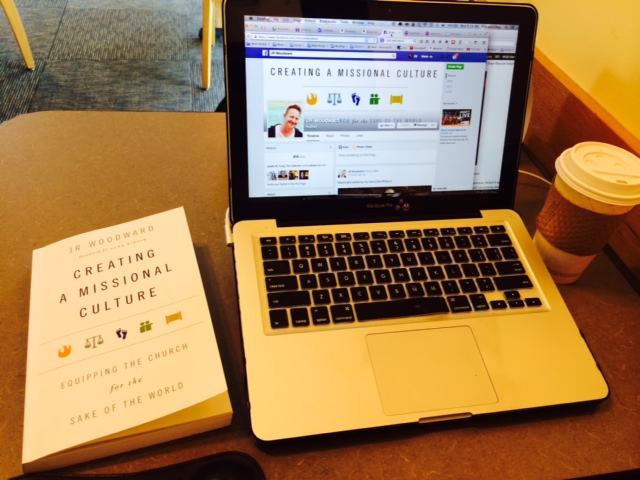I am entering a new season of life and ministry as I work with a team to launch Restoration Church (Fall 2015). The vision is to be a missional, multiethnic, and multiplying church. JR Woodward and the V3 Movement are significant influences and partners in the launch of Restoration Church, so a review of JR’s book, Creating a Missional Culture is relevant.

In the intro Woodward states, “More than a strategy, vision, or plan, the unseen culture of a church powerfully shapes her ability to grow, mature and live missionally.” (p. 19). This is similar to what Sam Chand says in his book, Cracking Your Church’s Culture. I highly recommend Chand’s book as a supplement and stand alone resource on church culture in general.
Creating a Missional Culture is broken into four parts…
Part One: The Power of Culture
In this section Woodward answers the question of how culture works. He identifies six elements that create culture. They are:
1. Language
So, what does the language of the congregation you serve reveal? Do the words people speak reveal an understanding that God is missional in his essence, and that we, like him, are a sent people, and that we are to live in the world for the sake of the world? (p. 36)
2. Artifacts: three essential artifacts are given: Scripture, communion, and the hymns and liturgy.
How do the members of the church you serve approach Scripture? Do they seek a theology of mission in the Scripture, or do they recognize that Scripture is a byproduct of mission, revealing missional theology, which is forming them to join God in his mission? Do they look to the Scripture to inform or transform them? Do they spend more time critiquing the Scriptures or allowing God to critique them through Scripture? Does the community understand the Scriptures as static or dynamic? (p. 37)
When people come to the Table in the congregation you serve, do they remember that Jesus’ body was broken for all and that his blood was spilled for the whole world, and thus seek to be bearers of God’s saving purpose for his whole world? Or do they view themselves as exclusive beneficiaries of God’s grace? (p. 37)
3. Narratives
As you consider the congregation you serve, is the narrative of the community shaping people to love Christ more, be more like him and deeply engage the world in order to see God’s kingdom become a greater reality? (p. 38)
4. Rituals
Rituals answer the question, What are our core practices? When talking about rituals, we will look at rites, practices, and liturgies. (p. 39)
5. Institutions
Understanding how a congregation handle power distribution and how they maintain unity when it comes to their vision, strategy and marks of faithfulness helps discern the culture of the church. (p. 41)
As you assess the congregation you serve, ask yourself these questions: Does the congregation take a hierarchical or grass-roots approach? Does one person wield authority, or is authority revolving and dispersed (a polycentric approach)? Is there a bottleneck in the structure, or does the church take a more open-source approach? Is cohesion maintained by rigid authority or through relationships and collaboration? (p. 41)
6. Ethics
As you consider the congregation you serve, is there a clear understanding of what it means to be faithful and fruitful, and does it reflect something more substantial than how many people come to a service and how large the budget and building are? (p. 43)
Chapter 4, Polycentric Leadership and Missional Culture, was a breakthrough for me. The foundation for this concept is a shift in how Ephesians 4:11ff is interpreted. Rather than eliminating the apostolic and prophetic gifts, as most do, Woodward suggests a fivefold ministry pattern as essential for the church today!
Paul seems to say that without a fivefold ministry pattern, we cannot mature and become the masterpiece that God intended. (p. 59)
The beauty of the vision that Paul is laying out for us [in Ephesians 4] is that we learn to develop a diverse team of leaders who together can cultivate communities to be more like Christ. (p. 59)
Woodward suggests,
One of the reasons the church is losing the digital generation is we have failed to incarnate an approach to leadership which takes seriously the major shifts our culture is experiencing… These cultural shifts highlight the vulnerabilities of a centralized leadership structure, which I contend never should have characterized the church in the first place. (p. 60)
See Alan Hirsch and Tim Catchim in their book, Permanent Revolution, for an in-depth discussion of this topic. A review of their book is forthcoming.
Part Two: A Leadership Imagination That Shapes Missional Culture
In this section Woodward builds a foundation upon which a polycentric model of leadership can be built. This has been transformational for me and the team I’m working with. Absolutely central for all leaders to work through.
- Chapter 5 – the challenging shifts of media, philosophy, science, spatial, & religion. Areas church leaders need to be aware of.
- Chapter 6 – the story of leadership through biblical history.
- Chapter 7 – deepening theological roots so that one can build a a strong and clear polycentric model of leadership.
- Chapter 8 – embracing emotional health, dealing with brokenness as an essential aspect of polycentric leadership.
- Chapter 9 – letting go of control. JR gives examples of the polycentral model of leadership in recent research, politics, art, business, and non-profits. This chapter alone is worth buying the book for.
Part Three: The Five Culture Creators
In this section Woodward deals with Jesus as the ultimate five-fold equiper-leader. He then gives a chapter each to full descriptions of the five-fold equipping ministry.
- Apostle (dream awakener), creating a discipleship ethos and calling people to participate in advancing God’s kingdom.
- Prophet (heart awakener), calling the church to God’s new social order and standing with the poor and marginalized.
- Evangelist (story teller), proclaiming the good news by being witnesses and being redemptive agents.
- Pastor (soul healer), cultivating life-giving spirituality within community and embodying reconciliation.
- Teacher (light giver), immersing ourselves in Scripture and dwelling faithfully in God’s story.
Part Four: Embodying a Missional Culture
This is the how-to section of the book. It’s full of examples and real life suggestions. If the church is to become a missional movement it’s leaders must wrestle with how to embody missional culture. Woodward’s book, especially this section, gives such leaders the fuel for fruitful discussion, prayer, and change.
Pastor/leader, do you, your team, and your church a favor and read Creating a Missional Culture together. I cannot wait to see how the church we are launching creates such a culture and participates in a missional movement. I hope to see you along the journey!
QUESTION: Have you read Creating a Missional Culture? If so, what have been your key take-aways?









